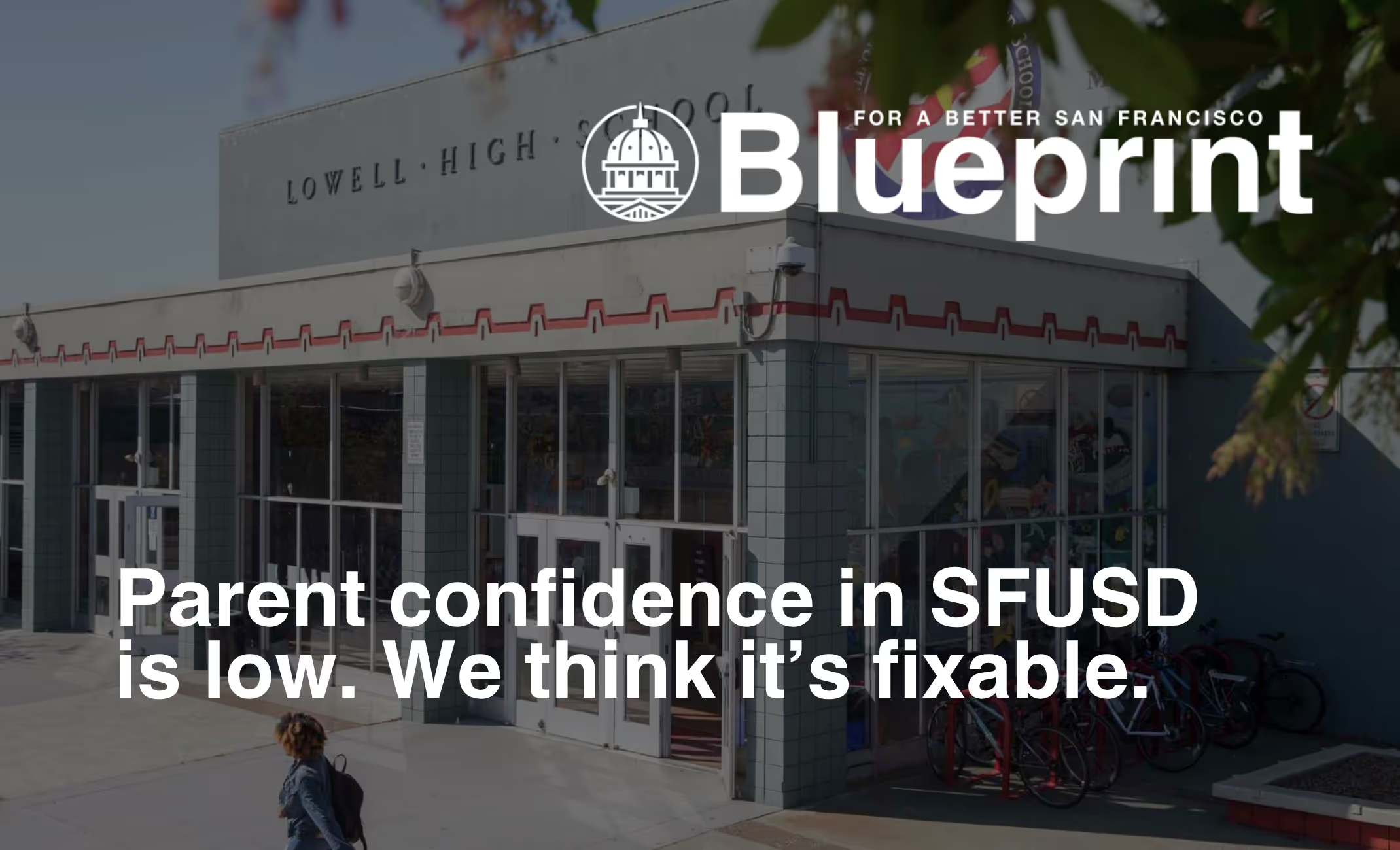
A new poll commissioned by our parent organization, Neighbors for a Better San Francisco, shows that there is a deep level of dissatisfaction with the direction of the district, especially amongst current SFUSD parents. Specifically, parents expressed that the implementation of an ethnic studies curriculum felt rushed and opaque. While there is broad support generally for including ethnic studies in curricula (a position we also share as an organization), the way in which this course was selected, reviewed, and implemented has eroded confidence in the administration at SFUSD.
The poll, conducted by Change Research from July 10 to July 15, 2025, surveyed 533 likely voters in the 2026 election.*
Key Findings
General Direction
The majority of parents surveyed - regardless of whether or not they have a child enrolled in SFUSD - feel that the district is somewhat or entirely off track; 42% of respondents feel the administration is taking SFUSD down the wrong track, while only 9% felt that the school district was heading in the right direction. However, when broken out by current SFUSD parents, the results shift; amongst current SFUSD parents, 51% feel things are entirely on the wrong track, while 41% say things are “somewhere in the middle.” In the most binary sense, 92% of current SFUSD parents who responded don’t think SFUSD is headed in the right direction.
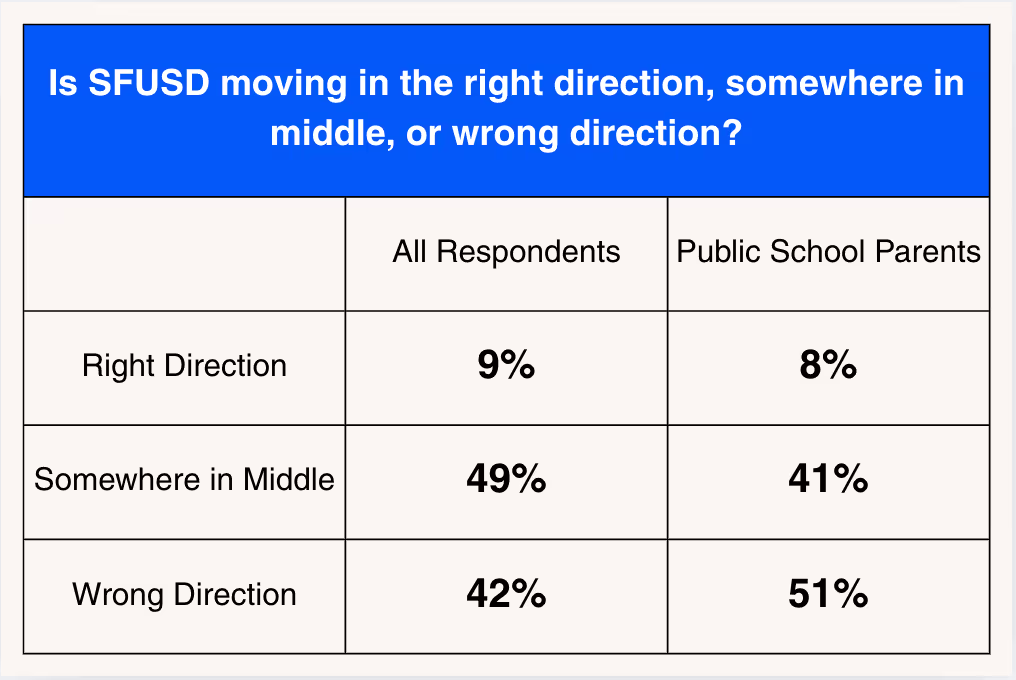
Academic Prioritization
The overwhelming majority of respondents (73%) believe that “improving academic performance for all students” should be a top priority for SFUSD. “Strengthening math and literacy outcomes” (66%) and “access to college and career pathways” (52%) both enjoyed broad support. Only 27% of parents believe that teaching ethnic studies should be a top priority for SFUSD. While the poll did find broad support for ethnic studies being taught, the poll also clarifies that parents expect other academic and readiness initiatives to be more highly prioritized.
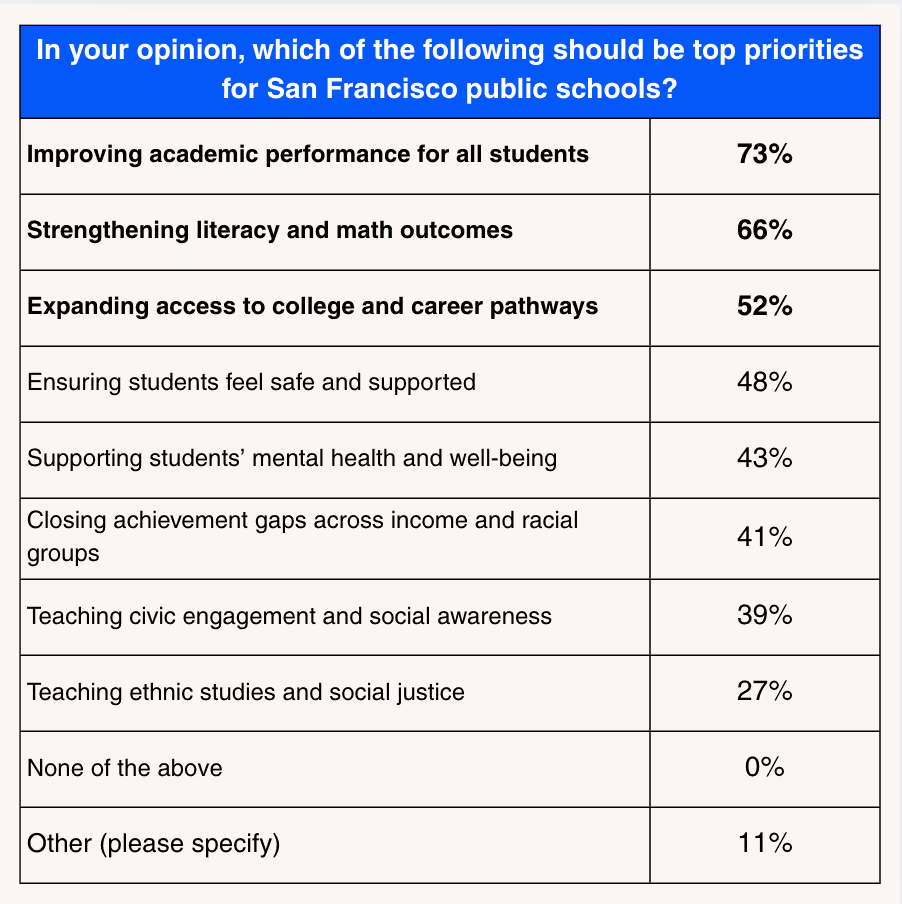
Ethnic Studies Objectives
Respondents had a clear hierarchy of objectives they wanted out of ethnic studies curricula; for all of the reasons to teach ethnic studies, 48% believe it should help students learn about cultures different from their own, while 46% believed it should both help students develop empathy and understanding for others and also prepare students to live and work in a diverse society.
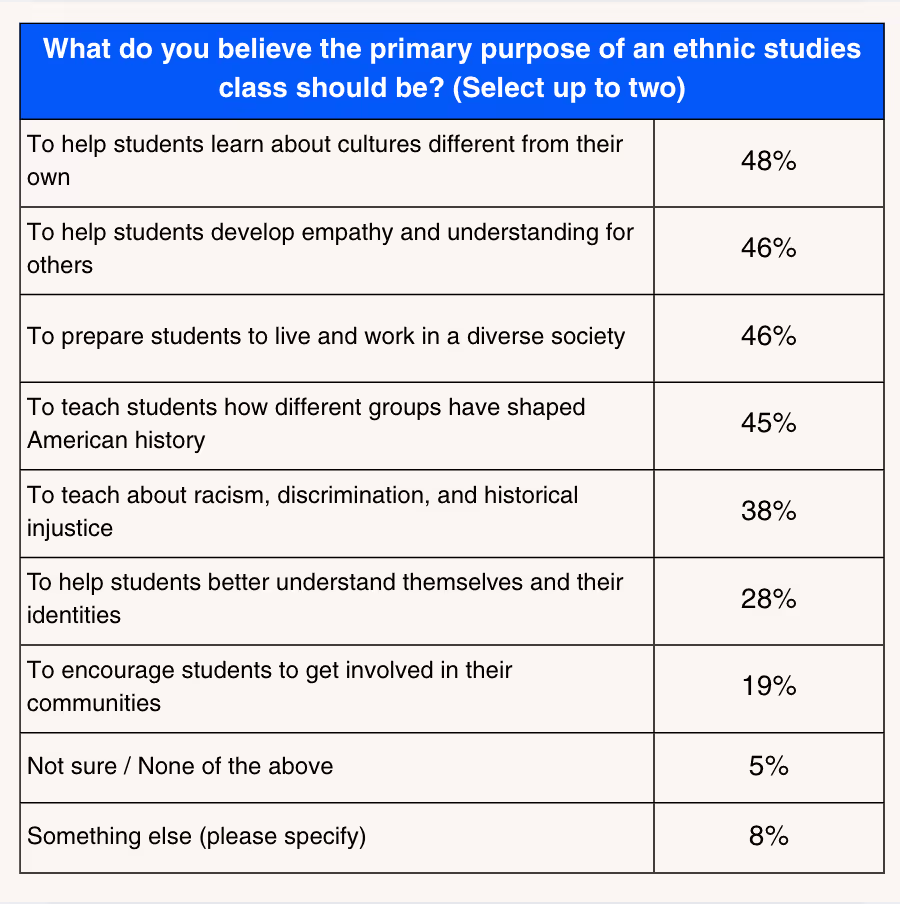
When you look at public school parents who responded, the primary purposes become even more pronounced:
- 49% To help students learn about cultures different from their own
- 37% To help students develop empathy and understanding for others
- 47% To prepare students to live and work in a diverse society
- 49% To teach students how different groups have shaped American history
Consistency, Academic Readiness, and Transparency Matter.
Respondents were concerned about how ethnic studies was implemented at SFUSD for several reasons, the foremost of which were related to academic progression and course implementation. 63% of respondents were concerned that ethnic studies would delay students from taking classes actually required for college admissions (like advanced math or science). Related to SFUSD’s implementation approach, 63% were concerned the curriculum hasn’t been fully reviewed and made consistent across schools, and 61% felt like there needed to be more transparency around the content in the curriculum.
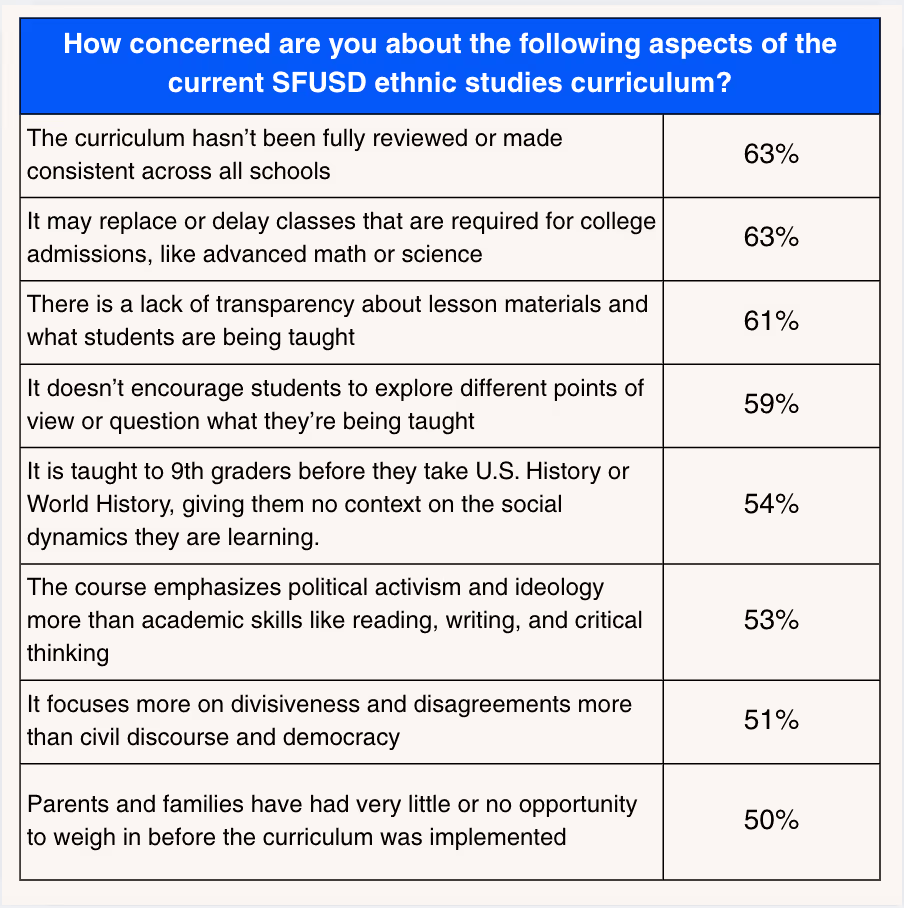
Specifically, public school parents reported being even more concerned in these three areas.
- 75% were concerned about ethnic studies delaying students from academically progressing (versus 63% of total respondents)
- 74% were concerned about how the curriculum was reviewed and the level of consistency by which it will be taught across schools (versus 63% of total respondents)
- 78% were concerned about the lack of transparency around curricular content
What does this all mean?
It’s clear from the respondents of the survey, and especially parents, that SFUSD’s administration mishandled the implementation of the ethnic studies curriculum ahead of the 2025-2026 academic year. These sorts of procedural missteps and perceived disorganization and chaos within the administration of SFUSD does nothing to instill further confidence in the prospect of a high-quality public education for San Francisco’s youth.
Part of our work at Blueprint (and more broadly with our parent organization, Neighbors for a Better San Francisco) centers on making San Francisco a city where families can feel confident raising their kids. A key piece of family confidence in San Francisco is a high-quality public education system. Learning outcomes should be measurable and demonstrable; with this in mind this poll provides a clearer understanding about what parents want out of an ethnic studies curriculum. We expect SFUSD to develop a framework to measure the success of ethnic studies, and to publicly report on whether or not this course is achieving said objectives.
Like all problems in San Francisco, the eroded trust between the administration at SFUSD and parents is fixable. Parents care that SFUSD gets the basics right; this doesn’t inherently preclude including ethnic studies in our curriculum. But without delivering on the fundamentals of a core curriculum (like math and reading), ethnic studies and other courses cannot become a distraction from the fundamental responsibility of our school district: educating our children in the foundational competencies that constitute academic readiness.
Through more transparency, less opacity around process, and clarity around curricular objectives, we are confident that SFUSD can get things back on the right track.
*Polling was conducted online from July 10-15, 2025. Using Dynamic Online Sampling to attain a representative sample, Change Research polled 533 likely 2026 general election voters in San Francisco, CA. Post-stratification was performed on age, gender, race/ethnicity, education, and region. You can see a full methodology statement here, which complies with the requirements of AAPOR's Transparency Initiative. Members of the Transparency Initiative disclose all relevant details about our research, with the principle that the public should be able to evaluate and understand research-based findings, in order to instill and restore public confidence in survey results.
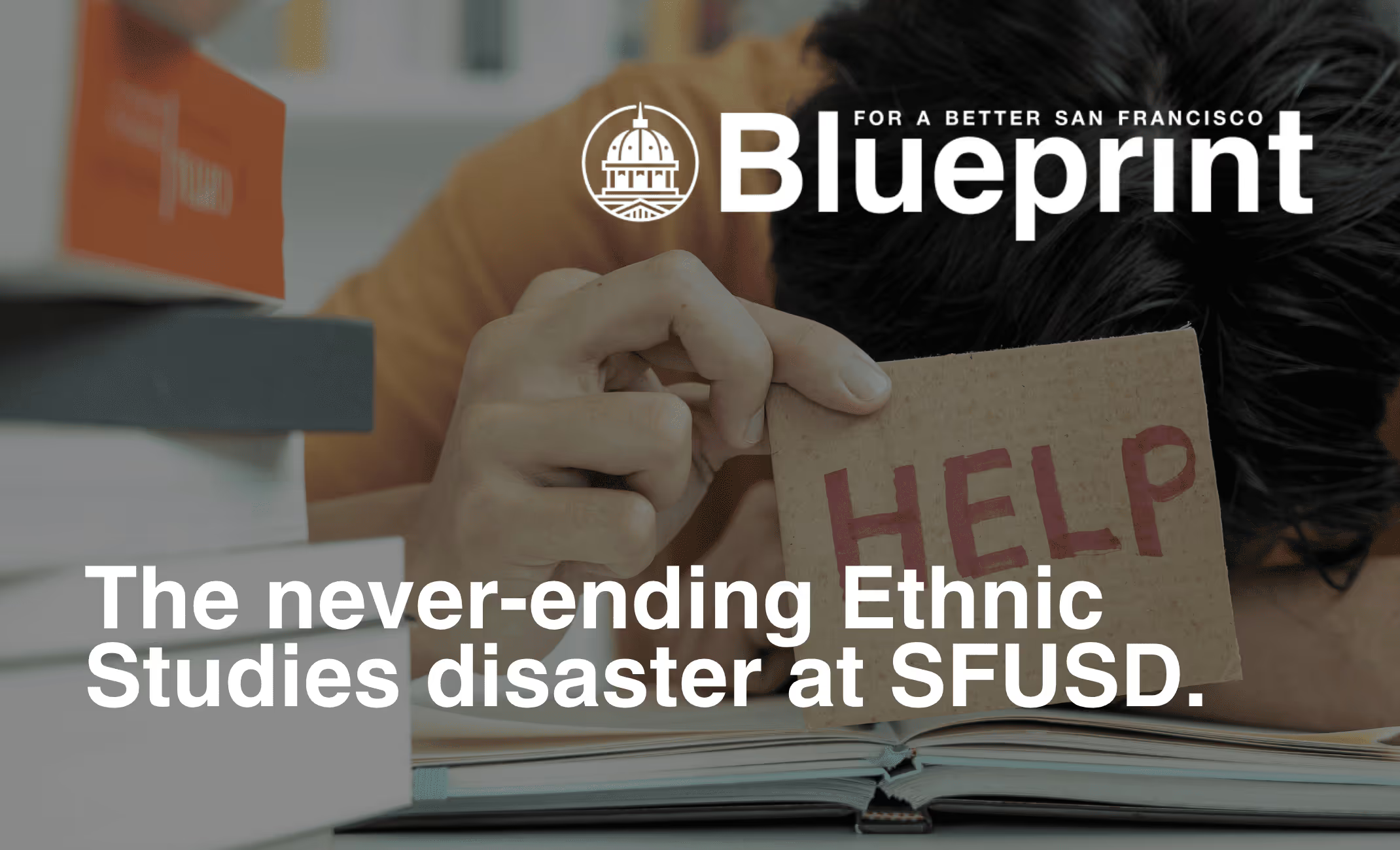
.webp)
.png)
.png)